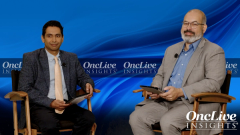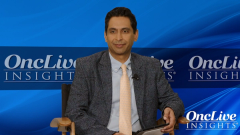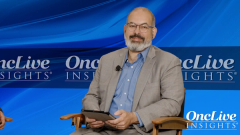
Challenges in the Management of Patients With SCLC
Jorge Nieva, MD, and Ashish Saxena, MD, PhD, discuss the impact of chemotherapy-induced myelosuppression on patients with SCLC.
Episodes in this series

Transcript:
Jorge Nieva, MD: Hello, and welcome to these OncLive Insights®, titled “Supportive Care Strategies for Chemotherapy-Induced Myelosuppression in Patients With SmallCell Lung Cancer.” I am Jorge Nieva, from the University of Southern California Norris Comprehensive Cancer Center, and I'm joined today by my esteemed colleague, Dr. Ashish Saxena, and I would like to welcome him to introduce himself.
Ashish Saxena, MD, PhD: Hi, thanks,George [Jorge]. I'm Ashish Saxena, I'm a thoracic medical oncologist at Weill Cornell Medical College, Meyer Cancer Center.
Jorge Nieva, MD: Welcome, and thank you for joining me. Today we're going to review the impact of myelosuppression in patients undergoing chemotherapy for smallcell lung cancer, with an emphasis on the use of supportive care for the treatment of myelosuppression. We'll also explore some newer data on supportive care treatments and consider how these data are reshaping the standards of care in the field. Let's get started. Dr Saxena, what are the most significant challenges when it comes to management of patients with smallcell lung cancer?
Ashish Saxena, MD, PhD: One of the things we see with patients with particularly extensive stage and metastatic smallcell lung cancer is that they can be quite sick from tumor burden. They have a lot of symptoms from their disease. A lot of times we end up treating them even in the hospital when they come in. That's definitely a challenge. The standard treatment still relies on chemotherapy for both in the first line and in later lines. Immunotherapy has definitely made some improvements in that, but we still use chemotherapy as a backbone. The chemotherapy is with carboplatin and paclitaxel, so you have 3 days paclitaxel, so they're getting 3 days, every day coming in for treatment, so that can be a challenge. With all that chemotherapy comes all of the side effects that we're well aware of with nausea, fatigue, and then chemotherapy-induced myelosuppression. And I'm wondering what your thoughts are about the impact of chemotherapy-induced myelosuppression on the daily lives of the patients?
Jorge Nieva, MD: As oncologists, we often underestimate the impact of fatigue, the impact of mouth sores, and other problems that really go along with myelosuppression. I've had mouth sores before and they're really uncomfortable and having them with chemotherapy is oftentimes very profound. I think the extent that we can use supportive care medications, to make the chemotherapy experience better for our patients, is important. Our patients also experienced a lot of fatigue associated with anemia. People don't feel well, oftentimes, when they're thrombocytopenic. Those of us who have treated for immune thrombocytopenia can often recall how patients, when their platelet counts are low, they just don't feel right. I think trying to mitigate all aspects of myelosuppression should be an important factor when we're treating our patients.
Ashish Saxena, MD, PhD: Absolutely.
Transcript edited for clarity.








































